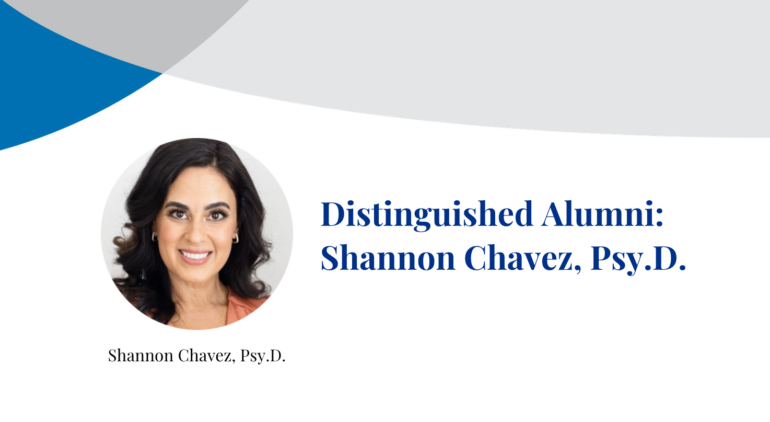By Lauren Dixon
From a young age, Shannon Chavez, Psy.D., CST, understood that sexuality wasn’t something people were comfortable speaking about. “How is this thing that we all have in common so difficult to talk about or taboo?” But she wasn’t yet aware of this exact specialty in therapy.
She recalls attending a class at The Chicago School when a sex therapist guest speaker asked if anyone in the room was interested in that niche of the industry. She excitedly raised her hand—she was the only one in the class to do so—expressing immediate enthusiasm.
“I found my passion for sex therapy at The Chicago School,” she says.
While many Ph.D. programs she had considered were research-based, she wanted to gain more practical skills for going into private practice, and The Chicago School helped shape that path, she says.
She graduated in 2010 and has since worked as a clinical psychologist at Sexual Health Experts (SHE) and now is a Licensed Psychologist and AASECT Certified Sex Therapist (American Association of Sexuality Educators, Counselors, and Therapists) with her own practice, specializing in sexual health and wellness and providing therapy services for individuals and couples. Recently, she expanded into virtual therapy and consultation, even providing some coaching outside of the U.S. Her community outreach work brings her to speaking engagements at universities and conferences.
“I’ve always been interested in and continue to want to help people overcome shame and embarrassment and celebrate sexuality rather than be afraid of it or look at it from a very clinical lens,” she says.
While Dr. Chavez had encouragement from her family to pursue higher education, she was the first to attend graduate school and didn’t know how it would look for her, especially regarding affordability and if it would be possible to work while attending courses. “I felt lots of support from The Chicago School,” she says. “I didn’t feel any moments where I didn’t have guidance around me,” she recalls.
Dr. Chavez credits The Chicago School with providing a well-rounded education and opportunities for her to figure out a niche in psychology via group practice, private practice, working with practitioners and mentors, guest speakers with intern opportunities, and more. “That was a great help in terms of figuring out where to start,” she says, adding that the university encouraged students to branch out to multiple modalities to shape their work.
She enjoyed being able to attend classes, then work at the counseling center with peers in practicum internship. “I loved that facility,” she says. “I loved that it was attached to our school. It really felt like they gave us the opportunity to learn the process of working in what would later be private practice,” such as booking clients, creating plans, and working in groups. “I thought it was a great way to get your feet wet and get into the work and have your peers there for support.” She remains great friends with individuals in her cohort.
Mentors that Dr. Chavez encountered along the way were especially notable for her. Nectar Redman, Psy.D., taught a few of Dr. Chavez’s courses and helped guide her career. Dr. Chavez credits Patti Britton, Ph.D., a human sexuality professor, for sharing the intricacies of the field. Together they facilitated workshops and events, and Dr. Chavez says that Dr. Britton has been there for everything throughout her career. Kathy MacLeay, Ph.D., also taught numerous courses, where Dr. Chavez learned about clinical work and how to apply learnings to a real-world practice.
Since graduating from The Chicago School in 2010 with a Psy.D. Clinical Psychology, she has established her own practice and has been published in The Journal of Sexual Medicine. Twice she has presented her research at the Congress of the World Association for Sexual Health.
“That has been incredibly rewarding to see not only the interest but the application of training that I’ve gone through that I can now help other providers with,” she says.
She’s working to reduce barriers around sexual health by taking a comprehensive approach, where doctors, specialists, and holistic healers can work together for the interest of clients in need. “I’m proud of the integrated model I got started in my career and have continued to promote in this field, which I think is helpful for clients who are looking to heal.”

